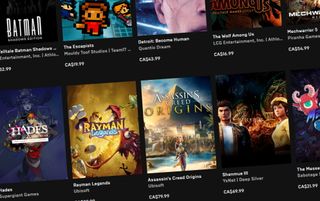Epic Games Store adds local pricing for Canada, Australia, and more
Five new currencies are now supported.

The evolution of the Epic Games Store continued today with the addition of regional currency support for Australia, Canada, Denmark, Norway, and Sweden.
The local currency support means that users in those countries—like myself, for instance—no longer have to worry about converting US dollars to our own funds, but will instead pay what's on the screen. It simplifies and stabilizes the process, and while currency fluctuations can raise or lower the relative value of your local cash, the pricing generally works out to be close to equivalent.
The Epic Games Store now accepts five new currencies: AUD, CAD, DKK, NOK, and SEK.Keep an eye on the Epic Games Store Roadmap for future updates: https://t.co/JcdYCdNmmD pic.twitter.com/Xgb8pluynNApril 29, 2020
Borderlands 3, for instance, is $60 US, which at this moment converts to $83.26 CDN and $91.48 AU; with regional pricing, it now sells for $80 CDN and $90 AU—basically a wash. That pricing also matches up with local currency pricing on Steam.
The addition of local pricing could make the storefront worthwhile for Australian gamers: for example, to pre-order Death Stranding on EGS cost $110 AU earlier this month, when converting from US dollars, but now it's a much more reasonable $91 AU.
With that taken care of, the Epic Games Store roadmap now indicates that a "Trending" storefront category, mod support, self-service refunds, offline sign-ins, add-on content discovery, and achievements are all "up next," although no dates are attached to any of it. It also recently implemented a temporary requirement to have two-factor authentication enabled in order to claim its weekly free games.
The biggest gaming news, reviews and hardware deals
Keep up to date with the most important stories and the best deals, as picked by the PC Gamer team.
Andy has been gaming on PCs from the very beginning, starting as a youngster with text adventures and primitive action games on a cassette-based TRS80. From there he graduated to the glory days of Sierra Online adventures and Microprose sims, ran a local BBS, learned how to build PCs, and developed a longstanding love of RPGs, immersive sims, and shooters. He began writing videogame news in 2007 for The Escapist and somehow managed to avoid getting fired until 2014, when he joined the storied ranks of PC Gamer. He covers all aspects of the industry, from new game announcements and patch notes to legal disputes, Twitch beefs, esports, and Henry Cavill. Lots of Henry Cavill.
Most Popular






